RESOURCES
2017-08-08 source:xinhua
BEIJING, Aug. 7 (Xinhuanet) -- "Liqiu" is the 13th of the 24 solar terms in the Chinese Lunar Calendar, reflecting the withdrawal of summer and the beginning of autumn.
Every year, "Liqiu" falls on the 7th or 8th of August. This year, it falls on August 7.
When "Liqiu" comes, summer is passing away and the weather turns cold gradually. Although it may remain hot for some time in many places of China even after "Liqiu", the weather tends to cool down.
In ancient times,"Liqiu" was divided into three phases, and 5 days in each phase: "In the fist phase comes the cool wind; in the second phase fall the white dews; and in the third phase cry the cicadas."
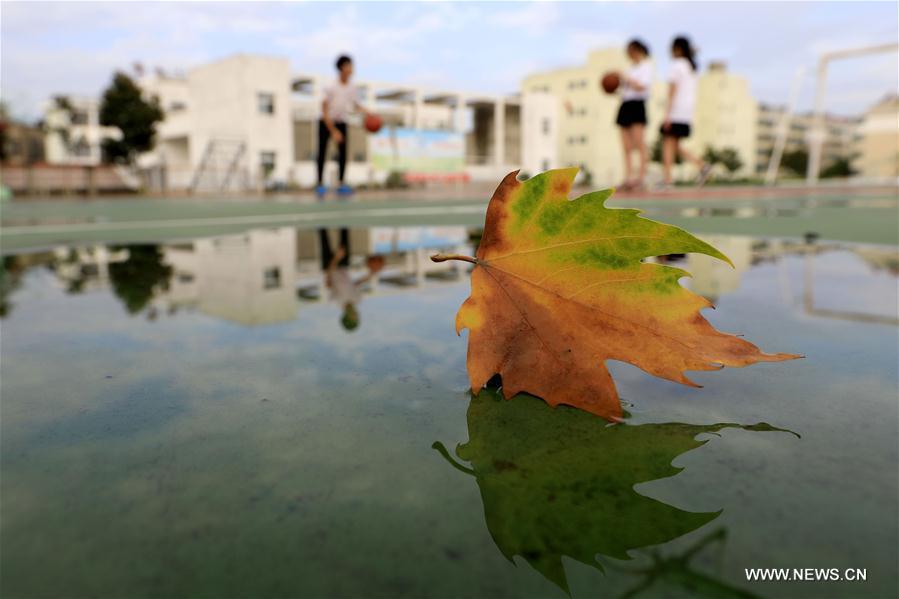
Photo taken on Aug. 6, 2017 shows a fallen leaf lying on the wet ground in Xuyi, east China's Jiangsu Province. (Xinhua/Zhou Haijun)
Summer ends and the harvest season comes
Autumn is a season of harvest. It is the time that autumn crops come into their crucial growing stage.
-- Farmers busy with sowing after "Liqiu"

Farmers work in the fields in Jiazhai Township of Liaocheng City, east China's Shandong Province, Aug. 7, 2017. Chinese solar term "beginning of autumn" falls on Aug. 7 this year. (Xinhua/Zhao Yuguo)
-- Early autumn harvest in the lotus pond

Early autumn harvest in the lotus pond Farmers pick lotus seeds in a lotus pond in Changxing county, East China's Zhejiang province, Aug 12, 2015. Liqiu, the Start of Autumn, not only foretells the end of the scorching summer, but also marks the approaching harvest season. It has been a tradition for farmers to pick lotus seeds in the Yangtze River Delta Area every year after Liqiu, one of the 24 solar terms that falls on Aug 8 this year. (Photo/Xinhua)
-- Fishing harvest in South China
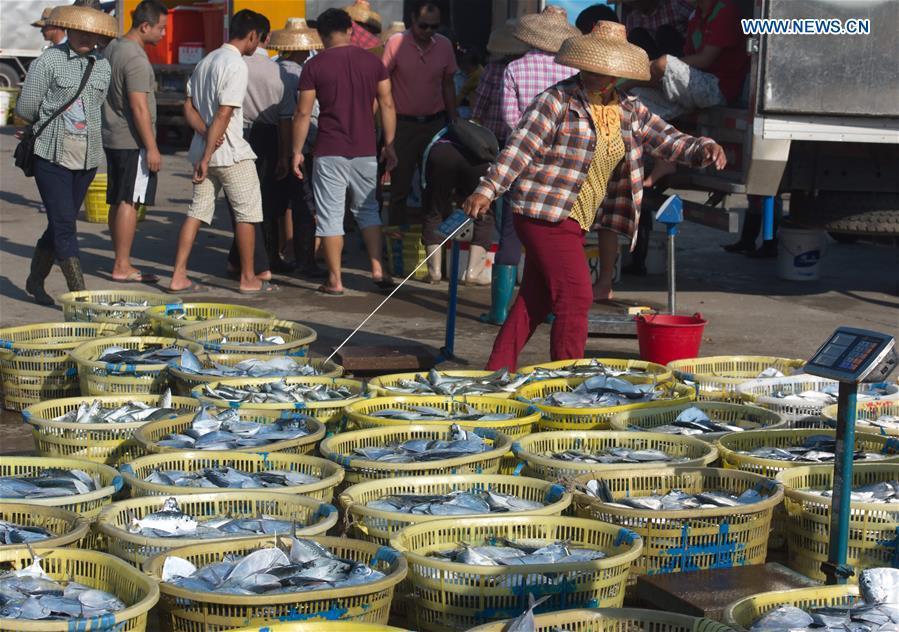
Fishermen unload fishes on a dock in Qionghai City, south China's Hainan Province, Aug. 7, 2016. Sunday marks "Liqiu", the first day of autumn on Chinese lunar calendar. (Xinhua/Meng Zhongde)
Customs about "Liqiu" are usually about delicious food
After "Liqiu", it's popular to "get the autumn fat", which is also called "Tie Qiu Biao" in Chinese. Since people have little appetite during the hot summer, cooling autumn becomes a season to make up fat lost during summer, and take in nutrition for the coming winter.
Thus, meat dishes are indispensable, especially in north east China.

People buy fresh pork at a market in Fuxin, northeast China's Liaoning Province, Aug. 7, 2016. Chinese solar term "beginning of autumn" falls on Aug. 7 this year. People usually eat meat on this day, with the meaning to make up fat lost during summer and store energy for the coming winter. (Xinhua/Li Mingfang)
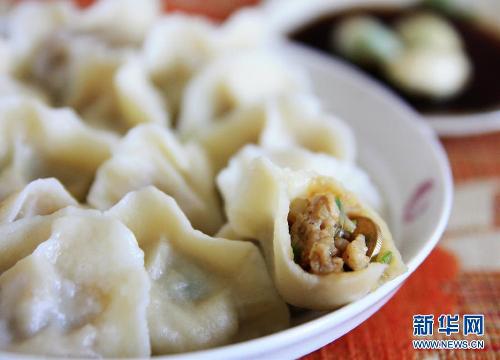
Dumplings (Xinhua file photo)

People buy meat at a shop in Boxing County, Binzhou City of east China's Shandong Province, Aug. 7, 2016. (Xinhua file photo)
"Ken Qiu" or "Yao Qiu", meaning "biting into autumn", is also a part of the ancient food traditions on the beginning day of autumn to fight against scorching hot after summer.
People usually eat watermelon and peaches, which was said to stave off bad health and prevent ailments related to the changing of seasons.
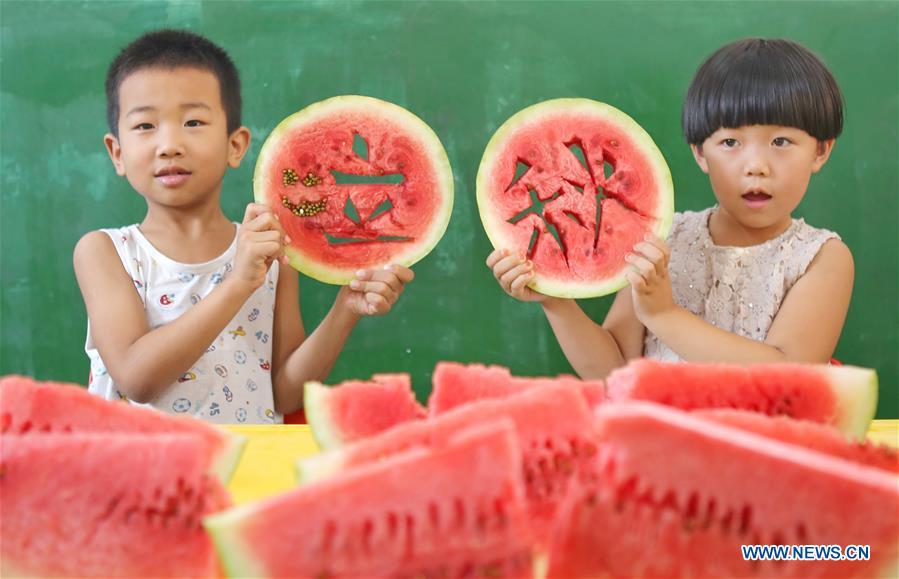
Children show watermelon caved with Chinese characters meaning "beginning of autumn" at Yucong kindergarten in Raoyang County of north China's Hebei Province, Aug. 7, 2016. Chinese solar term "beginning of autumn" falls on Aug. 7 this year. (Xinhua/Zhu Xudong)
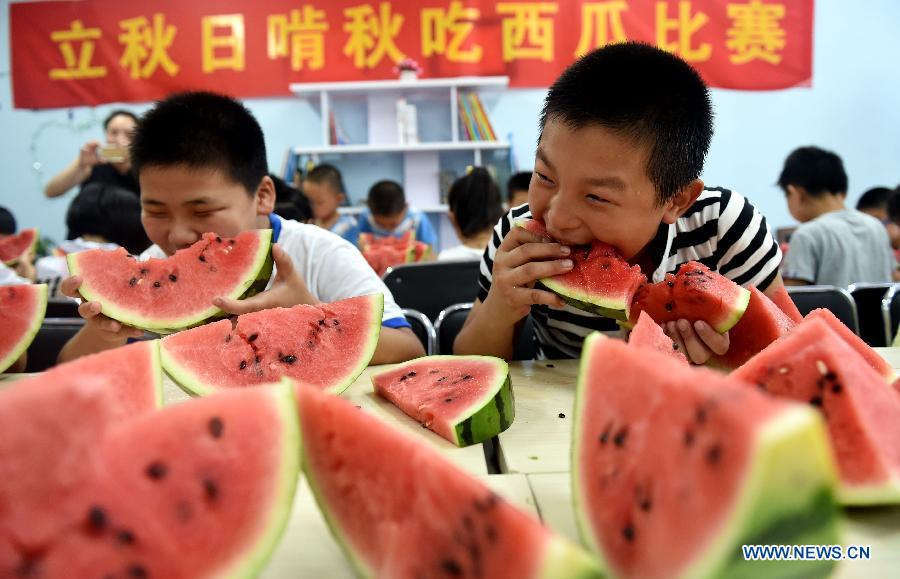
Children eat watermelons to meet the coming solar term "beginning of autumn" in Hefei, capital of east China's Anhui Province, Aug. 7, 2015. Chinese people has a tradition to eat watermelons or peaches before the "beginning of autumn," indicating to bite away "summer." The solar term "beginning of autumn" falls on Aug. 8 this year. (Xinhua/Liu Junxi)
Other solar terms left for this autumn
-- End of Heat (Chushu), on August 23 this year, is the 14th solar term of the year, implying that most parts of China have gotten rid of the hot summer. End of Heat is also the busy harvest season for farmers.

A harvester works in paddy field in Shixia Village of Renshou Town in Jing'an County, East China's Jiangxi Province, Aug. 23, 2016. Tuesday marks the Chushu, which means the end of heat in Chinese, of the solar terms. The scorching summer is going to pass by after this day. (Xinhua/Xu Zhongting)
-- White Dew (Bailu), on September 7 this year, is the 15th solar term of the year, indicating the real beginning of getting cold. The temperature declines gradually and the vapors in the air often condense into white dew on the grass and trees.

Photo taken on Sept. 7, 2015 shows a dragonfly resting on a leaf with dew drops on it near the Huaihe River in Huai'an, east China's Jiangsu Province. White Dew, the 15th solar term on the Chinese Lunar Calendar, falls on Tuesday this year. (Xinhua/He Jinghua)
-- Autumn Equinox (Qiufen), on September 23 this year,is the 16th solar term of the year, lying at the midpoint of autumn. Autumnal Equinox reflects the turning point of the variation of the altitude of the sun from astronomical aspect. Day and night are equally long on that day.

Villagers air dry paddy in Guandong Village of Sanjiang Dong Autonomous County, south China's Guangxi Zhuang Autonomous Region, Sept. 22, 2016. Thursday marked the 16th solar term Autumnal Equinox and farmers are busy in harvest and paddy drying.(Xinhua/Liu Zheng)
-- Cold Dew (Hanlu), on October 8 this year, is the 17th solar term of the year. Temperatures are lower, and the dew is greater.

Dews are seen on plants at the central square in Jinhu County, east China's Jiangsu Province, Oct. 8, 2016. Saturday marks Cold Dew, the 17th solar term on Chinese lunar calendar. (Xinhua/Liang Debin)
-- Frost's Descent (Shuangjiang), on October 23 this year, is the 18th solar term of the year. Frost's Descent is the last solar term of autumn, during which time the weather becomes much colder than before and frost begins to descend.

Photo taken on Nov. 2, 2016 shows frost-covered leaves in Yiyuan County, east China's Shandong Province. (Xinhua/Zhao Dongshan)